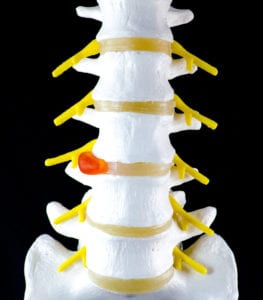
Injury, poor posture, or repetitive movements can result in compression on a nerve. Over time, this pressure can result in a painful condition commonly known as a pinched nerve. Nerve compression tends to occur in vulnerable places where there is little soft tissue for protection. Often, these points of injury are near ligaments, tendons, and bone. The resulting damage (and pain) can be minor, moderate, or severe.
Dr. Cody B. Doyle, a chiropractor and acupuncturist, treats pinched nerves in Roanoke, TX. Dr. Doyle has more than 21 years of experience in delivering holistic and effective treatment. If you are experiencing the symptoms of a pinched nerve, early treatment is critical to increasing your chances for optimal health outcomes and the prevention of further nerve damage.
Symptoms of a Pinched Nerve
A pinched nerve in your neck or spine can radiate pain outward. Early symptoms often include neck or low back pain. It is common for pain to reach the shoulders, arms, legs, and even the hands. Common symptoms include:
- Neck pain
- Lower back pain
- Numbness
- Tingling
- “Pins and needles” sensations
- Burning sensation
- Pain during certain movements
- Sudden onset of weakness
A pinched nerve can be the cause of other conditions, such as:
- Peripheral neuropathy: Peripheral neuropathy results from nerve damage. The condition can interfere with muscle movement or restrict normal sensations.
- Carpal tunnel syndrome: Carpal tunnel syndrome is a common form of mononeuropathy that results from strain. Individuals who perform repetitive tasks are at increased risk for developing this often painful condition.
If left untreated, scarring and swelling near the nerve can result. For some patients, rest can alleviate the symptoms of a pinched nerve. By abstaining from the movements that led to the pinched nerve (such as improper sleeping posture), some individuals are able to naturally recover. If your symptoms perpetuate or become more pronounced, you should seek relief at our Roanoke chiropractic clinic.
Treatment Options
While medications, injections, and even surgery are sometimes used to treat a pinched nerve, Dr. Doyle prefers using non-invasive treatments. Each condition is unique, so your treatment plans will be custom-tailored to your specific needs. After your thorough examination, Dr. Doyle may recommend any of the following:
- Chiropractic (Diversified, Activator, Thompson, or Gonstead methods)
- Acupuncture
- Herbal remedies
- Massage therapy
- Therapeutic exercises
- Auriculotherapy
- Nutritional planning and detoxifications programs
- Weight loss treatments
Once you have been fully treated, you will want to take proactive steps to prevent the return of a pinched nerve. It is important to understand common risk factors for a pinched nerve, which include diabetes, overuse of certain muscles, obesity, pregnancy, and prolonged bed rest.
A few steps you can take to prevent this condition include:
- Exercising regularly (with a focus on strength training and flexibility)
- Maintaining good posture and body positioning
- Limiting repetitive activities or taking frequent breaks
- Maintaining a healthy weight
Treat Your Pinched Nerve Symptoms in Roanoke, TX
While other doctors may recommend injections and medications for a quick fix, Dr. Doyle will take the time to look at your body holistically. By changing certain habits and developing new ones, you can prevent pinched nerves from returning. To schedule your consultation or treatment with Dr. Doyle, please contact our office online or call (817) 767-5430.


